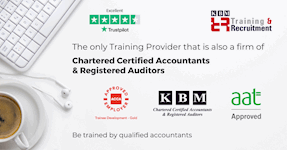
AAT Level 2 Certificate in Bookkeeping
Live Online Classes l Study anywhere, anytime
KBM training
Summary
Monthly Instalments without any interest
- Exam(s) / assessment(s) not included in price, and must be purchased separately
- Tutor is available to students
- TOTUM card available but not included in price What's this?
Add to basket or enquire
Overview
AAT Level 2 Bookkeeping equips you with the essential principles of double-entry accounting, including maintaining accurate sales and purchase ledgers, processing supplier payments and customer receipts, and performing bank reconciliations. We are committed to supporting all AAT students in acquiring practical skills and valuable work experience through our partnership with a leading chartered accounting firm. So you will not only gain the theoretical knowledge but also valuable work experience.
If you register for AAT Level 3 Diploma in Accounting, you can get AAT Level 2 for FREE.
Qualification
AAT Foundation Certificate in Bookkeeping - Level 2
CPD
Course media
Description
AAT Level 2 Certificate in Bookkeeping (Morning and Evening sessions available)
If you want to become a professional bookkeeper, the AAT Level 2 Certificate in Bookkeeping will give you the skills and essential knowledge you need to manage books effectively. The course offers a solid introduction to manual double-entry bookkeeping, including associated documents and processes, up to Trial Balance standard, providing a great starting point for anyone wishing to start a career in the accounting industry.
1) Introduction to Bookkeeping - AAT Level 2
- Understanding double-entry bookkeeping, integrating books of prime entry and describing coding system functions.
- Understanding discounts and settlement, trade and bulk discount differences.
- Preparing and processing customer and supplier invoices and credit notes.
- Totalling and balancing a 3-column analysed cash book.
- Totalling, balancing and reconciling petty cash records within an analysed petty cash book.
- Processing ledger transactions and extracting a trial balance
2) Principles of Bookkeeping Controls - AAT Level 2
- Understanding the purpose and use of control accounts and journals.
- Maintaining and using control accounts and the journal.
- Reconciling a bank statement with the cash book.
- Understanding the banking process and main services of banks and building societies.
- Understanding requirements of retention and storage relating to banking documents.
AAT Registration and Exam fee are payable separately.
We help all our students in Profession CV and Interview Preparation.
We have 92% pass rate for AAT which means you’re more likely to pass with KBM.
Limited spaces are available.
Register now and get the benefit of this amazing offer.
Who is this course for?
AAT Level 2 Certificate in Bookkeeping is ideal for anyone looking for a job in finance sector in order to help expand your Bookkeeping skills with KBM and will give both beginners and anyone who wants a refresher on the course of AAT Level 2 Certificate in Bookkeeping.
Requirements
AAT Level 2 Certificate in Bookkeeping has no requirements and anyone can access it very easily as AAT Level 2 is essentially the entry level for accounting.
Career path
AAT Level 2 Certificate in Bookkeeping can prepare candidates for jobs such as Bookkeeper, AP and AR so it's highly recommended to start with AAT Level 2 in order to expand your skillset in the accounting sector later on.
Questions and answers
Reviews
Currently there are no reviews for this course. Be the first to leave a review.
Legal information
This course is advertised on Reed.co.uk by the Course Provider, whose terms and conditions apply. Purchases are made directly from the Course Provider, and as such, content and materials are supplied by the Course Provider directly. Reed is acting as agent and not reseller in relation to this course. Reed's only responsibility is to facilitate your payment for the course. It is your responsibility to review and agree to the Course Provider's terms and conditions and satisfy yourself as to the suitability of the course you intend to purchase. Reed will not have any responsibility for the content of the course and/or associated materials.




